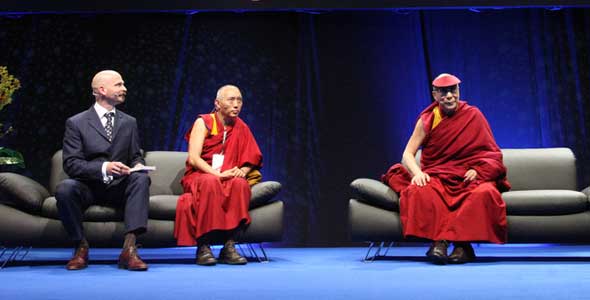Translating the Dalai Lama
When it comes to interpreting, though, the situation is completely reversed. Our listeners are more often than not simply overwhelmed: “How on earth can you listen and speak at the same time?” or “How can you memorise such a long speech?” We should compare interpreters to circus acrobats: Viewers stare in awe at the seemingly impossible feats, while they—the performers—know very well that it is all down to technique.
Which were the challenges then? First things first:
Technical problems
Hundreds of people in the hall and live broadcast on national TV, fleeing was definitely not an option.
So, I decided to understand the speaker. Just like that. I took the decision that I would understand him. I gathered all my concentration, pricked up my ears, gave a prod to my brains… and I actually started understanding him.
The next day I was translating the Dalai Lama from a booth and only then I realised the real problem was that I could not hear him. There was simply no foldback on stage, no monitor speakers, rear-facing loudspeakers enabling performers to hear themselves. Stage monitors are used in live performances, so the musicians are able to hear each other and play in time.
Long passages
“Oh, sorry, too long.” said the Dalai Lama. “Not too long. We’ll manage.” was my answer and so, before starting, I turned to the public. I have seen faces like that before, but this time they seemed much more sceptical than usually: “I bet he cannot remember everything. He will just stop somewhere in the middle, if he manages to find the beginning of it.”
These are the challenges that usually spur me into action. I relayed Dalai Lama’s eight minutes in a five-minute section.
Keeping calm simply means: No panic. You have the techniques and the skills, others have proven it can be done, and panic only stops your brain from functioning. Confidence and cold blood play an extremely important role in managing stress.
Take notes and memorise. Note taking is probably the most ‘technical’ aspect of consecutive interpreting. You simply do not have the time to write down entire sentences, even in the case of Dalai Lama, who speaks at a more forgiving pace.
You only jot down key words, essential pieces of information: years, numbers, dates, specialised terms and, most important of all, turns of thought. With practice you save time by developing your own symbols for the most frequently used words such as: world, every-thing/one/body, people, man, many/a lot, large, small, very/strongly, increase/development/advancement, etc.
Then there are much more trivial details to be added. As you take notes, you turn the pages and leave them hanging from your knee. Once the speaker’s segment is completed, you turn back all of the pages and turn them one by one as you were writing. After you have finished, you take the whole bunch of papers and fold them under the bloc, so that you know that you have already dealt with that section of your notes and when you start taking notes of the next part of the speech, those sheets will not turn out again and there will be no confusion. It is a simple, but extremely important trick of the trade.
Pen. Can you allow a pen to let you down while interpreting? Of course not. You must always have at least one spare pen. I prefer using fountain pens, as they flow more smoothly and do not leave stains, but need to be refilled more often. Mine ran dry after the Dalai Lama’s first words. In a split second, his personal assistant took out a Hilton pen from a mysterious fold somewhere inside his Tibetan attire. I calmly thanked him for the help and pulled my second fountain pen from my pocket.

The icing on the cake or the last trick
Good pronunciation and voice training are an important aspect of self-confidence. At the start of my career, I used to mumble and I spoke with a heavy accent. So, I have invested in a pronunciation course and voice coaching. Correct breathing, putting the right emphasis on the right words and so on all play part in improving communication.
Technical skills are the supporting structure and once they become second nature, you spare your brain much effort and you can entirely focus on the most important tasks in that particular moment: listening to the speaker, understanding the words, translating them in your mind, remembering what has been said and then saying it.
One last trick? Self-confidence thrives or falters depending on feedback. From any stage you will always have a full range of facial expressions in your audience. Most people in the audience have no discernible expression and it is difficult to keep your self-confidence and speak convincingly, if you see people shaking their heads, furrowing their brows or chatting with the person sitting next to them. You won’t be able to shake the thought that they are commenting your performance—negatively—of course.
Over the years I have learnt a trick and then discovered it is widely used by many public performers. Whenever I speak, I always look for ‘nodders’. I try to find shiny happy people, those agreeing with everything I say and nodding in approval. Or, at least, seem that way. They might be only having a good day, being in love or having just had the best coffee and are not interested in my interpreting in the least. To me it makes no difference! They seem to be cheering for me, saying: “Bravo!” and nodding encouragingly.
It helps a lot even if their heads are bobbing because of Parkinson’s.
